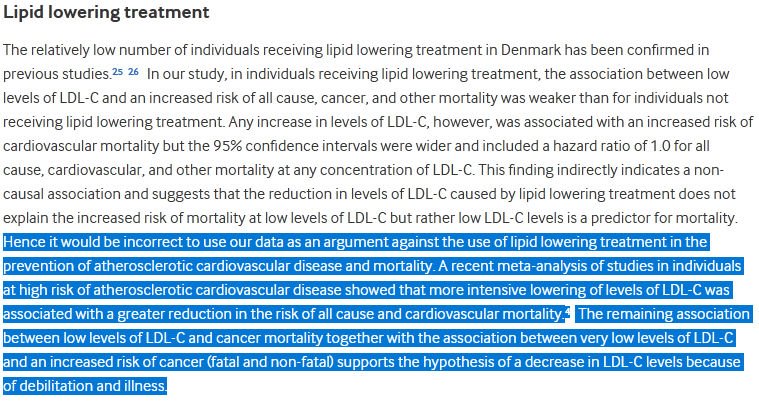Regarding the highlighted part: I’ve not argued against this. I’ve said we lack data - which we do.
Statins are prescribed to prevent CVD under certain conditions that vary somewhat depending on the country but generally amount to (1) secondary prevention - for which their benefit is clearly established, and (2) primary prevention - in the event risk calculators show a risk greater than X over Y years.
Example language for (2) from 2019 ACC/AHA Guideline on the Primary Prevention of Cardiovascular Disease.
“Statin therapy is first-line treatment for primary prevention of ASCVD in patients with elevated low-density lipoprotein cholesterol levels (≥190 mg/dL), those with diabetes mellitus, who are 40 to 75 years of age, and those determined to be at sufficient ASCVD risk after a clinician–patient risk discussion.”
There are other criteria commonly used to prescribe. For instance, you can use a calculator, and typically if the 10 year risk is > 7.5%, a statin is recommended.
https://tools.acc.org/ASCVD-Risk-Estimator-Plus/#!/calculate/estimate/
You might note that statin therapy is not indicated in all cases, and may not be indicated in a person with an LDL of 140 who is otherwise in good health (non-smoker, not diabetic, no hypertension, etc.).
Suggesting lower LDL may not always be indicated is NOT an argument against the use of lipid lowering treatments in the prevention of ASCVD & mortality *** in populations for which they are currently indicated. ****
It is an argument that they may not be indicated for the entire population. This argument is consistent with the standard of care established by our leading cardiology groups (the ACC & etc.). I see you like to suggest others shouldn’t do their own research but instead should rely on the experts. Actually this is the consensus position of the experts.
Regarding the all-cause data: you can’t do a meta analysis of a population that wasn’t studied in the underlying RCTs. If you have an RCT that shows they gave statins to a large population irrespective of their starting CVD risk and this showed an ACM benefit, please do share it. I don’t think such a study has been done?
If that study hasn’t been done, the studies you are quoting are merely demonstrating that statins benefit the people for whom they are typically prescribed - those at elevated risk of CVD. It doesn’t show more than that. I certainly agree with that, which is why I take Rosuvastatin myself.
If that study hasn’t been done, you are making an error in generalizing from a patient population for which statins are indicated to a patient population for which, till now, they have not been prescribed. It could turn out that that extrapolation is accurate; it may turn out otherwise. We won’t know for sure until we do the study.
And you are very much doing your own research if you are listening to Peter Attia on this subject when he is deviating from the established medical consensus. I personally have no arguments against doing one’s own research. But you apparently do. Although you are on this site. And trying to get your LDL down to ~30? Weird.
